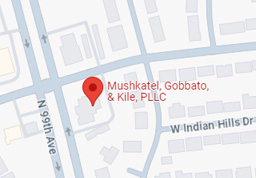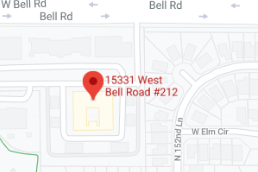Arizona Statute of Limitations for Wrongful Death

When your family has lost a loved one unexpectedly due to someone else’s fault, you may be eligible to pursue compensation for your loss through a wrongful death claim. While you undoubtedly have much on your mind during this difficult time, you shouldn’t wait to contact an attorney to discuss your legal rights and options under the Arizona wrongful death statute.
Arizona law places a deadline on filing a lawsuit to pursue a wrongful death claim. This deadline, known as the statute of limitations, ensures the prompt filing of legal claims before evidence gets lost and people’s memories fade. Waiting too long to file a wrongful death claim may jeopardize your family’s right to demand compensation and accountability for your loved one’s death and the losses your family has suffered as a result.
Table of Contents
- What Is Arizona’s Statute of Limitations for Wrongful Death Claims?
- Are There Any Exceptions That Could Shorten the Deadline?
- Can the Statute of Limitations Be Extended?
- What Do I Have to Do Before the Statute of Limitations Expires?
- What Happens If I Miss the Deadline?
- When Should I Contact a Wrongful Death Lawyer?
- Contact an Arizona Wrongful Death Lawyer
What Is Arizona’s Statute of Limitations for Wrongful Death Claims?
Arizona’s statute of limitations for wrongful death claims requires a family to file a lawsuit against the responsible party within two years of the date of their loved one’s death. It’s important to note that this date may be later than the date of the actual incident that led to their passing.
Are There Any Exceptions That Could Shorten the Deadline?
In certain circumstances, families may have a shorter deadline to file their wrongful death claim. For example, Arizona law states that when a family has a wrongful death claim against a public entity, school, or employee in Arizona, they must file a notice of claim within 180 days of their loved one’s death. The public agency has 60 days after receiving notice to decide whether to accept the claim. A family may file a wrongful death lawsuit after receiving a rejection of their claim or after 60 days have passed, but they must file their lawsuit within the statute of limitations. In these wrongful death cases, the statute of limitations is only one year.

Can the Statute of Limitations Be Extended?
Various legal doctrines can extend or “toll” the statute of limitations. One of the most used doctrines to toll the statute of limitations is the discovery rule. The discovery rule states that the statute of limitations does not begin to run until you discover or reasonably should discover the death was wrongful.
For example, when a loved one passes away due to medical malpractice, the two-year period may not begin until you find out that a healthcare provider’s negligent treatment caused their death. Once you discover your family’s wrongful death claim, the two-year limitations period starts running.
Courts may also toll the statute of limitations under other circumstances. For example, a court may extend the statute of limitations if a defendant fraudulently conceals evidence of their liability for the death or leaves the state. The statute of limitations may also be extended for a wrongful death claim held by a minor for their parent’s death.
What Do I Have to Do Before the Statute of Limitations Expires?
Your family must file a wrongful death lawsuit against all the parties who may bear liability for your loved one’s death and your family’s losses before the statute of limitations expires. If your family has a wrongful death claim against a public entity or employee in Arizona, you must provide them with notice of your claims within the 180-day deadline.
As a result, you may have limited time to investigate your family’s wrongful death claim and recover and organize evidence into a compelling legal case. For this reason, you must prioritize contacting an Arizona wrongful death attorney to investigate your claim and file the necessary paperwork ahead of the deadline.
What Happens If I Miss the Deadline?
If you miss the deadline for your wrongful death claim, you may lose the opportunity to pursue financial recovery and accountability for your loved one’s death. Courts strictly enforce the filing time limits for legal claims. When you file after the applicable deadlines expire, the opposing party can file a motion to dismiss your case. Courts only permit cases filed after the deadline to continue in limited circumstances, such as when conditions beyond a family’s control delayed their efforts to file within the applicable deadlines.
Waiting to prepare and file a wrongful death claim may mean that you have lost access to evidence, as physical proof gets cleaned up or repaired, records get deleted or destroyed, and witnesses’ memories fade. As a result, you may have a less compelling legal case than you would have if you’d started preparing your family’s wrongful death claim immediately after your loved one’s passing.
When Should I Contact a Wrongful Death Lawyer?
Because you have limited time to file an Arizona wrongful death claim, you should contact a lawyer as soon as possible after a loved one dies from injuries or health complications caused by someone else’s wrongful acts. A lawyer will need time to investigate your family’s claim, gather evidence, and prepare a compelling case to present in a claim notice or demand letter. Waiting too long to talk to a wrongful death lawyer may not give them enough time to investigate your claims thoroughly and prepare a compelling case. Contacting a lawyer as soon as possible after a family member’s death will give you the best chance of filing your claims on time to pursue the compensation you need.
Contact an Arizona Wrongful Death Lawyer
After losing a loved one due to someone else’s actions, you need skilled legal assistance to file your family’s wrongful death claims within the applicable deadlines. Contact Mushkatel, Gobbato, & Kile, P.L.L.C. today for a consultation with an Arizona wrongful death lawyer to discuss your family’s legal rights and options.













